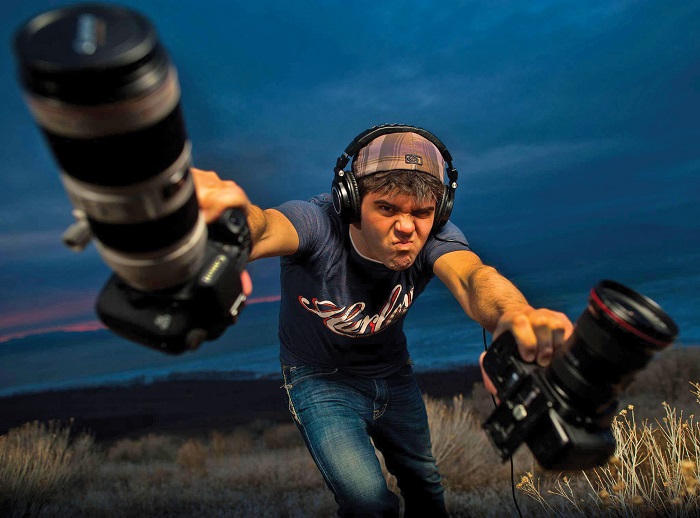
Chances are, if you are over forty, you have never heard of Casey Neistat, PewDiePie, Smile More, and other national YouTube sensations. But living in Utah, maybe you have heard of the father-son pair who travel everywhere with their What’s Inside Channel.
Have you heard of Devinsupertramp? He makes high-budget short action thrillers on YouTube. The Piano Guys are pretty ubiquitous. Their music video playing piano on red rock cliffs with Coldplay reached 74 million views. This single video, released in 2012, skyrocketed them to fame. These folks are all Utah YouTube phenoms.
Whether these newby sensations provide you hours of enjoyment for their humor, banter and fun, or hours of pain for how annoyingly-addicted your kids are to such stupidity, all of these YouTubers have a few things in common — they directly connect with their audiences without the aid or assistance of any network exclusivity agreements or record contracts. Nobody made these people famous except their audiences. Content has been democratized. Power to the people!
The former mainstream media gatekeepers of our eyes, ears and brains are losing their power. This is huge because those who control marketing campaign purse strings for the largest, most successful brands are realizing that the ad campaigns they are cooking up in New York ad agencies are far less effective. We are in the middle of a vast social experiment with no precedent and few guidelines.

Anyone with a smartphone can create ideas. Two young adults who appear to be college dropouts named their channel “Where’s My Challenge?” The pair will perform just about any challenge thrown at them by their audience, including eating raw cactus thorns. They down entire bottles of insanely hot ghost pepper sauce, and they don’t omit the painful aftermath.
These young men are not role models by any means, yet they earn thousands of dollars from their IQ-lowering antics. The copycats are prolific. Kids doing stupid things with the cameras rolling is now commonplace. The cinnamon challenge was only the beginning. Just the other day I watched kids on skateboards with cameras. They were crashing and falling from their boards and laughing. Have you seen Idiocracy? Go see it. This level of insane stupidity was predicted 15 years ago by genius satirist Mike Judge.
PewDiePie specialized in recording his game play on the XBox with his insightful commentary like “LOL! JK!” He has 75 million YouTube subscribers. He was even crowned King of YouTube by even Forbes Magazine. But millions of parents would probably wish their children’s attention would be diverted elsewhere. He makes rap videos with explicit lyrics, and offers pop culture commentary on programs such as Dr. Phil. His estimated monthly income is $300 thousand. That’s correct. Per month. In 2015 alone he earned $12 million.
But recently, YouTube made stipulations on funding stupidity. Instead of demonetizing only the inane acts of jackasses, they decided to deplatform any video which could be even remotely considered controversial to advertisers. Their choice of videos to deplatform or demonetize demonstrates an obvious bias.
Prager University, which provides pithy five-minute political videos, has seen many of their popular videos demonetized by YouTube. Their videos with content about the Civil War and slavery, and another concerning gun rights for women, were demonetized without explanation other than “violating YouTube’s standards.” However, Nation of Islam leader, Minister Louis Farrakhan, who claims, “Jews are Satan’s chosen people,” receives a pass. So much for objectivity.
In another of his videos, Farrakhan says, “The satanic Jews control everything and mostly everybody.” This is not considered banned “hate speech” by YouTube. This double standard is causing everyone to realize that maybe we miss the good old days when Amazon, Google, Youtube and Facebook didn’t control 90% of the delivery of online media.
The new social media are no longer simply offering platforms, but rather, are determining who is worthy of having a voice and who isn’t, and other social media platforms are following suit. However, a push back is occurring, with new platforms rising almost daily.
Conspiracy theory peddler, Alex Jones, was banned from YouTube, Facebook and Twitter. Now Patreon is choosing which social commentators should be allowed to use their services. Carl [Sargon of Akkad] was banned from the donation platform site, but since then Patreon has suffered some serious fallout.
Dave Rubin (of the popular YouTube channel the Rubin Report), Author Jordan Peterson and Sam Harris, who are all members of “The intellectual Dark Web,” are abandoning Patreon, which will cost them tens of thousands of dollars in the short term. But they have banded together to create their own platform. This is promising news, because without the content providers, the platforms lose their enormous power. What are we as viewers to make of all of this?
If we choose to spend hours per day with YouTube, Google and Facebook, we are essentially deciding who gets to decide for us what we see and don’t see. These big brothers are many times larger and more powerful than any TV network ever was. Perhaps it’s time to divert more of our attention to the real world and local matters rather than the virtual and banal.
Would you like to get paid to produce great content? Send us a story that provides insight and offers the “voice of local Utah” and if we publish it we will pay you.



